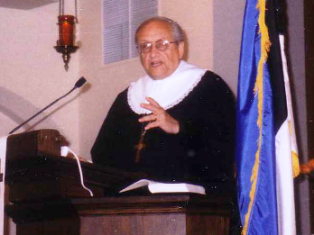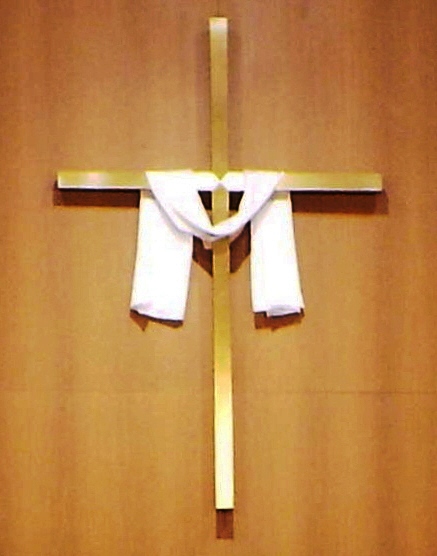|
|
||||||||||||||||||||||
|
Tere
tulemast Bergen County Welcome to the Bergen County Congregation's website ! "Jumal
paneb suurelistele vastu, aga alandlikele Ta annab armu."
Igatseme
saada koju Selle
kirjutuse teemaks on „kodu“, mitte meie kodu siin ilmas, vaid meie
kodu, mis ootab meid igavikus. Mõnedel meist on olnud võimalus reisida
selle suve jooksul, mõned on saanud reisida isegi Eestisse, teised on
teinud lühemaid reise. Me kõik teame, et varem või hiljem reisi
kestel hakkame mõtlema oma kodu peale. Tahame jälle koju saada, kus kõik
on tuttav ja kindel. Peatame korraks tulevikus ja mõtleme kodule, mis
ootab meid igavikus. Me oskame öelda Meie Isa palve peast. Algame
tervitusega “Meie Isa, kes sa oled taevas…” Jeesus andis meile
selle palve. Tema ütles meile, kus meie taevane Isa on, ”TAEVAS”.
Kui Jeesus pärast surnuist üles-ärkamist ütles oma jüngritele,
et Ta läheb Isa juurde ja et ka jüngrid teavad hästi, kuhu Ta läheb.
Aga jüngrid ei saanud aru, mida Jeesus mõtles oma väljendusega. Siis
Jeesus kinnitas, et Tema, on
tee, tõde ja elu ja mitte keegi ei saa taevariiki muidu kui Tema kaudu.
Jeesus aitab meid saada taevasse, kus meie Isa elab oma inglitega ja oma
Poja Jeesusega. Millal
me aga saame Taevase Isa juurde, taeva kodusse? Me elame siin maa peal.
Mõnele meist on antud palju aastaid siin maailmas. Kui oleme terved ja
ilma valusid, me ei muretse, kuid mõned kannatavad haiguste ja
viletsuste käes ja on saavutanud oma arvates juba vanaduse piiri ja
ihkavad siit lahkuda. Sain ühel õhtul telefonikõne ühelt endiselt
koguduseliikmelt. Olin teeninud seda kogudust mitmeid aastaid, pidanud
piiblitunde ja jumalateenistusi. Olime kõik siis päris noored, nn. ”meheeas”,
kuid nüüd olen ka mina vanaduse aastates, samuti selle koguduse
liikmed. Vananemise käigus
oleme hakanud mõtlema rohkem ja rohkem elu lõpule, surmale. Tema kõne
põhjuseks oli küsimus, mis juhtub ta ihule, kui ta sureb. Vastasin
talle ja sellega meile kõigile, et pärast maist surma, me saame uue
ihu, jumaliku ihu. Meie hing on ju surematu. Loeme Piiblist, et surma
puhul hing läheb tagasi Isa juurde, kes selle on andnud ja ihu muutub põrmuks,
kust tema on võetud.(Koguja 12:7) Lohutav on mõelda elule pärast elu,
nagu õpetaja Uno Plank kirjutab oma jutluste raamatu pealkirjas. Elu pärast
elu on Taevase Isa juures, kuhu Jeesus on läinud meie eel meile aset,
elukohta, valmistama. Elame
praegu väga raskel ajal, kus paistab, et see maailm on täis ebaõigust,
valetamist, vägivalda, riidu, vargust ja ebaõiglasi otsuseid, Mõtleme
Ukraina riigi ja rahva peale. Millised kannatused neile on antud. Rahvas
peab oma kodumaalt põgenema Venemaa vallutajate eest. Loodame, et
Ukraina pagulased saaksid peatselt kodumaale tagasi. Loodame, et nende
saatus poleks sama kui meil, kes pidime jääma pagulusse kümneteks
aastateks ja kui Eesti viimaks taastas oma iseseisvuse, tuli see
paljudele meist nn. liiga hilja, et tagasi kodumaale minna. Oleme olnud
õnnelikud siin Ühendriikides, abiellunud, saanud järeltulejaid mitmes
põlves. Me ei aktiivselt mõtle enam oma maha jäänud kodudele Eestis,
sest meie ei saaks enam tagasi ega jaksaks ka seal nn. uut elu alustada.
Oleme rahul siin ja mõtleme uue lootuse ja rõõmsa ootusega oma uuele
ja igavesele elule taevariigis. Uue
Testamendis Ilmutuse raamatus loeme taeva kirjeldust järgmiselt: Ma nägin
uut taevast ja uut maad; sest esimene taevas ja esimene maa olid kadunud
ning merd ei olnud enam. Ja ma nägin püha linna, uut Jeruusalemma,
taevast Jumala juurest alla tulevat. Ja ma kuulsin valju häält
troonilt hüüdvat: „Vaata,
Jumala telk on inimeste juures ning
tema asub nende juurde elama ning nemad saavad tema rahvaiks ning Jumal
ise on nende juures nende Jumalaks. Tema pühib ära iga pisara nende
silmist ning surma ei ole enam ega leinamist ega kisendamist, ning valu
ei ole enam, sest endine on möödunud.” Tema ütles mulle: „Ära
pane pitseriga kinni selle raamatu ennustuse sõnu, sest aeg on lähedal!”
WHO IS A GOOD SAMARITAN? Luke
10:25-37 Sometimes
it feels that whenever Jesus needs to make a point, He talks about
Samaritans. A good Samaritan
is someone who helps a stranger. In fact, here in New Jersey and many
other states, there are laws that we call “Good Samaritan Laws”
which generally protects people from any civil liability if they render
aid at an accident scene. They’re intended to stop bystanders from
being hesitant to help because they have a fear of being sued for
possibly causing harm in the process. In
today’s text, the priest and the Levite are certainly not following
the Good Samaritan law, choosing instead to keep walking. So let us
focus on them first. The priest was not like priests, pastors, or even
rabbis today. In ancient Israel, the priesthood was something men were
born into. They were all descendants of Aaron, the older brother of
Moses. If someone wasn’t from Aaron’s lineage, they couldn’t be a
priest. They were the only ones who could officiate offerings in the
Temple. So ritual cleanliness was of vital importance. Having contact
with the dead or bloody would have made a priest ritually unclean. The
same way, the Levite, who was a direct descendent of the tribe of Levi,
was someone who had to remain ritually clean. Levites served important
functions in the temple, like serving as guards, singing, or playing
music, as well as having other religious and even political duties. He,
too, had to remain ritually clean in order to do his job. And
here’s the interesting point of the story: neither man did anything
biblically wrong! In both cases, these men passed by the beaten man who
had been left for dead because the law of Moses was very clear about how
they should live and how they should always remain ritually clean. So,
they were doing precisely what they had been commanded by the Law. The
lawyer, listening to Jesus telling the parable, would have known this,
too. Up to this point, he was following the story very clearly. We, too,
have followed the story to this point. But here’s where we might lose
the actual purpose of the story; and that is, the parable of the Good
Samaritan isn’t about good deeds versus bad deeds. Maybe it’s not
about deeds at all. Take
note how Jesus doesn’t praise the Samaritan for his deeds, any more
than He condemns the priest or Levite for theirs. He’s making a bigger
point about religion, which He does so often throughout His ministry.
During Jesus’ time, religion had all-encompassing power. To live the
right, proper, and moral life was the most important thing; every rule
had to be followed and every law had to be kept. This was the only way a
person could even hope of remaining on good terms with God. And
this would have resonated with the lawyer because he wasn’t a lawyer
in our modern terms. Instead, the lawyers of Jesus’ time were tasked
with interpreting and explaining the often-complex laws of the Bible and
determining what a good person could or should do, and what they could
not do, because God’s law was the law of the land. With
that, life became legalistic; people lived according to Thou Shalts and
Thou Shalt Nots. They lived according to religious laws. To the priests,
Levites, and lawyers – and any devout Israeli – following the law
was the most important thing, even if that meant ignoring someone in
need. And so, the law’s requirement to stay ritually clean was more
important than the life of another person. Because in order to get rid
of the sins that people created because it was impossible to follow
every law, people had to go to the Temple and sacrifice an animal. And
as we saw earlier, only the priest could perform this sacrifice for the
people to atone for their sins. So we are back to the importance of
being ritually clean, and avoiding the dying and the dead. But another
thing the law taught the people was that anyone outside of their own
tribe and people was unclean and unholy. Which
brings us to today. We look at our world today, and we often see that
we’ve become like the priest and the Levite, drawing into our own
worlds. We create our own neighbourhoods that draw us together with
others who are just like us. We create neighbourhoods in our political
affiliations, our national identities, and even our denominations. The
churches we belong to, the Party we vote for, and the country we live in
– we make these our neighbourhoods, and we consider them better than
others because we think we are “right” and others are “wrong.”
We think we’re holy and blessed, which leads us to view others who
aren’t like us as bad or unholy. But
none of these things – the church we belong to, what our politics are,
or the country we live in – literally none of these things are what
the world needs or makes it a better place. We only manage to make it
easier for us to justify crossing to the other side of the street and
passing by others who are not like us. We
as Christians must live differently than that. We belong to something
bigger than any place or country or group on earth. We belong to God,
and we are explicitly commanded by Jesus to go into the whole world –
the entire world – to preach and teach and live the Good News of Jesus
Christ. Jesus
teaches us to be like a Samaritan and to treat others – even our
enemies - like our neighbours. This teaching would have struck the
lawyer hard – because he didn’t see the Samaritan as good or clean
or right. And if we think about it, it can be difficult for us, too.
Let’s change that word “Samaritan” to something we consider the
exact opposite of who we identify with. Now behave with compassion
towards them. That’s hard and very uncomfortable. Jesus,
throughout the Gospels, teaches us to go outside our comfort zones. He
constantly reminds us to go outside our neighbourhoods. But we don’t
want to, because we’ve convinced ourselves like the priest and the
Levite that we’re right and everyone else is wrong. And that is a sin. “For
all have sinned and fall short of the glory of God,” Paul reminds us
in Romans. Everyone has sinned, including us good, holy Lutherans. The
fact is it doesn’t matter how hard we try we are going to sin. But
that’s not meant to be a depressing reminder, and it’s not meant to
discourage us, because Jesus was teaching us these things for a very
specific reason; to help us accept that He is the Way, the Truth, and
the Life. No one comes to the Father except through Him. So
here’s a lesson for us from today’s parable: Let’s not be the
priest or the Levite. And maybe, let’s not even think of ourselves as
the Samaritan. Instead,
let’s consider that we may be that man who was robbed, and lay
bleeding and dying on the side of the road. Both the priest and the law
– earthly religion and politics - has passed us by, unable to save us.
But the one who did stop and save us was Jesus. He took us in, bound our
wounds, and paid for our care – all with his precious blood, shed on
the cross for our sins. Paul
writes in today’s Epistle lesson: “He has rescued us from the power
of darkness and transferred us into the kingdom of his beloved Son, in
whom we have redemption and the forgiveness of sins.” Because
Jesus has saved us, we have become members of His kingdom, joining
together will all the saints throughout time. And His kingdom, as we
know, is not of this world; it has no beginning or end; it has no
boundaries, and lasts forever. And that is a big neighbourhood!
Pastor
Markus Vaga - August 2022
|
|
|||||||||||||||||||||
This page last edited August 25, 2022 08:57:11 AM
|
||||||||||||||||||||||





